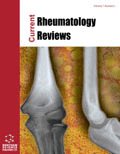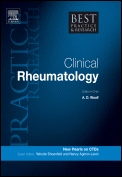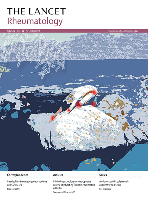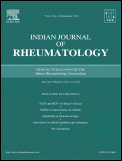
RHEUMATIC DISEASE CLINICS OF NORTH AMERICA
Scope & Guideline
Empowering clinicians with comprehensive, evidence-based articles.
Introduction
Aims and Scopes
- Clinical Management of Rheumatic Diseases:
The journal extensively covers practical approaches to the diagnosis and management of various rheumatic conditions, including systemic lupus erythematosus, rheumatoid arthritis, and vasculitis. - Interdisciplinary Care and Collaboration:
There is a consistent emphasis on the importance of interdisciplinary care in rheumatology, highlighting collaborations amongst healthcare providers to improve patient outcomes. - Emerging Therapies and Biomarkers:
The journal regularly explores new therapeutic modalities and biomarkers relevant to rheumatologic diseases, providing insights into future treatment directions. - Patient-Centered Care:
A significant focus is placed on the patient experience, incorporating patient-reported outcomes and mental health considerations into the management of rheumatic diseases. - Environmental and Genetic Factors:
Research articles also delve into the environmental and genetic factors influencing the onset and progression of rheumatic diseases, acknowledging their role in treatment and prevention.
Trending and Emerging
- Immune Checkpoint Inhibitors and Their Effects:
Recent publications have highlighted the implications of immune checkpoint inhibitors in rheumatology, particularly their adverse effects on patients with pre-existing autoimmune conditions, signaling a growing area of interest in this intersection. - Mental Health and Chronic Illness:
There is an emerging focus on the psychological aspects of living with rheumatic diseases, including mental health considerations and the impact of chronic illness on quality of life. - Pediatric Rheumatology:
An upward trend in pediatric rheumatology topics has been observed, emphasizing the unique challenges and advancements in treating rheumatic diseases in children and adolescents. - Patient Engagement and Experience:
The journal is increasingly publishing articles that emphasize the importance of patient engagement, shared decision-making, and the incorporation of patient experiences into clinical practice. - Environmental Factors in Disease Management:
There is a growing recognition of environmental risk factors related to rheumatic diseases, with research exploring how these factors can influence disease onset and progression.
Declining or Waning
- Traditional Pharmacological Approaches:
There has been a noticeable decrease in publications focusing solely on traditional pharmacological treatments for rheumatic diseases, as the field shifts towards more innovative and personalized medicine approaches. - Basic Science and Mechanistic Studies:
Research that primarily explores basic science and mechanistic studies related to rheumatic diseases appears to be waning in favor of clinical applications and patient-centered research. - Generalized Guidelines without Specificity:
The journal has moved away from generic treatment guidelines and recommendations, favoring more nuanced, condition-specific management strategies that reflect the complexity of individual patient needs.
Similar Journals

Current Rheumatology Reviews
Advancing knowledge in rheumatology.Current Rheumatology Reviews is an esteemed journal dedicated to publishing comprehensive reviews on advancements in the field of rheumatology. Established by Bentham Science Publishers, this journal has become a vital resource for researchers, clinicians, and students seeking to stay abreast of the latest developments and therapeutic strategies from 2006 to 2024. Located in the United Arab Emirates, it caters to a global audience, delivering insights that have been pivotal in shaping clinical practices. With an impact factor reflective of its Q3 status in Rheumatology by 2023, the journal ranks #46 out of 73 in the Scopus database, positioning it in the 37th percentile in the discipline. Although it operates without open access, its high-quality content ensures that each article undergoes rigorous peer review, making the Current Rheumatology Reviews a trusted platform for disseminating critical research findings and reviews that drive forward the understanding and treatment of rheumatic diseases.

Reumatismo
Advancing knowledge in rheumatology for a healthier future.Reumatismo is a distinguished Open Access journal dedicated to the field of rheumatology, published by PAGEPRESS PUBL since 2001. With a rich history dating back to 1952, this journal has been pivotal in disseminating vital research on rheumatic diseases and related disorders. Based in Italy, Reumatismo has earned a reputation for its quality and relevance, achieving a Q3 category ranking in the 2023 Scopus metrics for Rheumatology, reflecting its significant contributions to the field. The journal is committed to providing a platform for the latest scientific developments and clinical innovations, thus aiding researchers, healthcare professionals, and students striving to enhance understanding and treatment of rheumatic conditions. For those seeking to access comprehensive research articles and studies, Reumatismo boasts an open access policy, ensuring that knowledge is freely available to all, fostering collaboration and advancement in rheumatology worldwide.

BEST PRACTICE & RESEARCH IN CLINICAL RHEUMATOLOGY
Connecting Knowledge to Clinical PracticeBEST PRACTICE & RESEARCH IN CLINICAL RHEUMATOLOGY, published by Elsevier, stands as a premier journal in the field of rheumatology, holding a prestigious Q1 ranking in both Medicine (miscellaneous) and Rheumatology categories as of 2023. With an ISSN of 1521-6942 and an E-ISSN of 1521-1770, the journal is dedicated to advancing clinical knowledge and practice through the dissemination of high-quality, peer-reviewed research. Since its inception in 1995, this journal has provided a platform for researchers, clinicians, and healthcare providers to share significant advancements, best practices, and innovative insights that shape the standards of care in rheumatology. The commitment to open access publishing reflects its mission to broaden the reach of critical research findings, ensuring that professionals across the globe can access valuable information in this vital field. The journal's impressive Scopus ranking, positioned at #10 out of 73 in Medicine-Rheumatology, alongside its notable impact factor, underscores its importance and influence in guiding clinical practice and policy in rheumatologic conditions. By engaging with this journal, readers can stay informed about emerging trends and evidence-based strategies that are crucial for improving patient outcomes.

Current Rheumatology Reports
Driving innovation in rheumatology since 1999.Current Rheumatology Reports is a premier journal dedicated to advancing the field of rheumatology, published by Springer. With an esteemed Q1 category ranking in Rheumatology as of 2023 and a remarkable Scopus rank of 6 out of 73, this journal stands at the forefront of research dissemination, boasting an impressive percentile ranking in the 92nd. Since its inception in 1999, Current Rheumatology Reports has provided a critical platform for the latest findings in rheumatological diseases, treatment strategies, and clinical practices. Although it currently does not offer Open Access options, the journal's rigorous peer-review process ensures high-quality publications that are essential for researchers, clinicians, and students alike. By keeping the community informed of key developments, this journal plays a vital role in shaping contemporary rheumatological research and practice, thereby facilitating the advancement of patient care worldwide.

Lancet Rheumatology
Leading the way in cutting-edge rheumatology research.The Lancet Rheumatology, published by Elsevier, is a premier academic journal dedicated to advancing the understanding of rheumatology and immunological diseases. Launched in 2019, this esteemed publication has quickly become a leading source of research, achieving an impressive Q1 ranking in both the fields of Rheumatology and Immunology as of 2023. With Scopus rankings placing it at #2 out of 73 in Medicine - Rheumatology and #6 out of 233 in Medicine - Immunology and Allergy, the journal serves as an essential platform for disseminating high-quality, peer-reviewed articles that address the latest findings and clinical practices in these domains. The journal, accessible in print and online, is committed to fostering knowledge and collaboration among researchers, healthcare professionals, and students alike, making it an invaluable resource for those seeking to deepen their expertise in rheumatology and its interrelated fields.

Open Access Rheumatology-Research and Reviews
Transforming Rheumatology Research through Accessibility.Open Access Rheumatology-Research and Reviews, published by DOVE MEDICAL PRESS LTD, is a distinguished journal that has been a vital part of the rheumatology field since its inception in 2009. With an ISSN of 1179-156X, this journal is dedicated to disseminating groundbreaking research and comprehensive reviews in the discipline of rheumatology, making it an essential resource for researchers, clinicians, and students alike. It boasts an impressive Q3 ranking in the Rheumatology category for 2023, reflecting its relevance and quality within a highly competitive landscape, where it ranks in the 51st percentile among its peers as indicated by the Scopus Ranks. As an open-access platform, it ensures that critical findings and insights are easily accessible to a global audience, promoting collaboration and knowledge sharing. The journal's scope includes a wide range of topics within rheumatology, aimed at advancing understanding and treatment of musculoskeletal disorders and autoimmune diseases. Its headquarters is located in New Zealand, positioning it as a key player in the international research community.

CURRENT OPINION IN RHEUMATOLOGY
Fostering Informed Dialogue in RheumatologyCurrent Opinion in Rheumatology, published by Lippincott Williams & Wilkins, stands as a vital resource in the field of rheumatology. Since its inception in 1989, this prestigious journal has been at the forefront of disseminating cutting-edge research, with a notable Q1 ranking in the 2023 Rheumatology category and an impressive Scopus rank of 7 out of 73, placing it in the 91st percentile. The journal's commitment to presenting insightful reviews and critical analyses of recent advancements and treatment strategies makes it an essential read for professionals, researchers, and students dedicated to the study of rheumatic diseases. Although not an open-access journal, Current Opinion in Rheumatology continues to foster an informed dialogue within the academic community through its high-impact content, ensuring that the latest developments and practices are accessible to those at the vanguard of rheumatology research.

CLINICAL AND EXPERIMENTAL RHEUMATOLOGY
Navigating the frontiers of immunological discovery.CLINICAL AND EXPERIMENTAL RHEUMATOLOGY is a prestigious journal published by CLINICAL & EXPER RHEUMATOLOGY, dedicated to advancing the field of rheumatology and immunology. With a rich history dating back to 1983, the journal serves as a critical platform for researchers, clinicians, and professionals seeking to disseminate and discuss innovative findings in these rapidly evolving areas. Featuring an impressive Q2 ranking in both Immunology and Allergy, as well as Rheumatology, this journal is recognized for its high-quality contributions, placing it among the top tier of academic publications. Operating without an open access model, CLINICAL AND EXPERIMENTAL RHEUMATOLOGY is headquartered in Pisa, Italy, and publishes articles that undergo rigorous peer review to ensure excellence in research. This journal is an invaluable resource for those dedicated to improving patient outcomes through evidence-based practice in rheumatology, immunology, and related fields.

Indian Journal of Rheumatology
Advancing knowledge in rheumatology, one article at a time.Welcome to the Indian Journal of Rheumatology, a premier scholarly platform dedicated to advancing research and clinical practice in the field of rheumatology. Published by SAGE Publications Inc., this journal has been providing open access to its valuable content since 2006, promoting the dissemination of knowledge in India and beyond. As a voice in the rheumatology community, the journal addresses a wide range of topics including epidemiology, diagnostics, treatment strategies, and patient care in rheumatic diseases. Despite being classified in the Q4 category of the 2023 Scopus rankings, with a current position of Rank #57 among 73 journals, it serves as an essential resource for researchers, healthcare professionals, and students seeking to stay updated with the latest developments. The journal is committed to fostering scholarly dialogue and facilitating access to research that influences practice and improves patient outcomes in rheumatologic care.

Arthritis & Rheumatology
Advancing Knowledge in Rheumatology and ImmunologyArthritis & Rheumatology is a leading journal dedicated to the advancement of knowledge in the fields of rheumatology, immunology, and allergy. Published by WILEY in the United Kingdom, this prestigious journal boasts an impressive impact factor and a prominent reputation, ranking in the Q1 category across multiple disciplines, including Immunology and Rheumatology. With its high ranking of 4th out of 73 in Rheumatology and notable standings in related fields, it serves as a crucial platform for researchers, healthcare professionals, and scholars to disseminate groundbreaking findings. The journal embraces an Open Access model, enhancing the accessibility of vital research to a global audience and ensuring that knowledge dissemination is maximized. Since its inception in 2014, Arthritis & Rheumatology has been at the forefront of impactful research, fostering collaboration and innovation in tackling complex challenges within these medical disciplines. Researchers looking to explore the latest advancements and engage with cutting-edge studies in these fields will find this journal to be an essential resource.